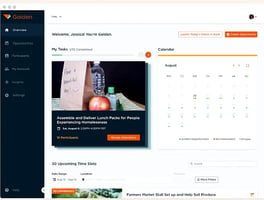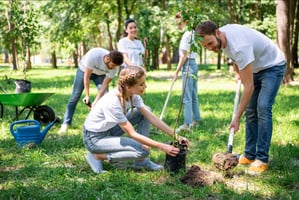Running a nonprofit can sometimes feel like trying to carry six bags of groceries while wrestling a...
Our Story
The summer of 2004, I had just graduated high school. Three of my best friends and I decided to celebrate by hitting the open road - a 12,000-mile trip around 38 of the 50 states. I kept a journal. Partly to document passing thoughts, and partly in an effort to think bigger, with a clear mind, about how I’d like to spend my future...
I had a special privilege of attending both a brand-new, start-up high school in Southern California, and a 200-year-old, traditional boarding school in the Northeast. Throughout that time I developed many interests. Mostly the same interests I shared with my peers - playing competitive sports, hanging out, and developing hobbies.
Many of my friends volunteered, but few of them seemed to enjoy it. More like they were going through the motions of pleasing their parents, serving as punishment, or attempting to build the ultimate college application. That type of pattern felt disingenuous to me. I was much more interested in the purity of helping others in need.
On the road in Arizona, thoughts began to flow onto the page of my journal. I began to consider what I really wanted to do with my time, who I wanted to be when I was on my own, not living with my parents, and with an opportunity to use time in college to be more deliberate about my future and place in the world.
I knew I wanted to understand the world around me better - to know more about things I hadn’t yet experienced, to have better context for other perspectives, and to develop a sense for which issues really were most pressing to the world, and if I were to be more deliberate about building a life, how I would want to spend it.
And the logical conclusion of all of this was that I wanted to volunteer more and more meaningfully. It was the obvious, free way to walk in other people’s shoes, see how they lived, and become familiar with issues that affect quality of life.
I’d tried to volunteer before - in every imaginable way. This meant asking friends where they went, going through schools and religious groups, calling volunteer centers, looking at online listing services, and reading the news. Every time I discovered an organization that looked promising, I had difficulty distinguishing it from other organizations that seemed to have similar missions - which were the real deal? How can I get ahold of anyone there? What programs do they offer? When are they scheduled? Am I qualified? Do I have to do training? Do I commit to months of an activity I barely understand? Pay to volunteer?
It really felt like the system was working against me. If I was this driven and the process was this hard, then why would anyone less motivated rationally go through with this nonsense? It turns out they don’t. Various resources quote different statistics, but figure about 90% of Americans want to volunteer, and only 25% or so actually do each year. There’s no question why. It is harder to do than it seems like it should be.
I enrolled in my undergraduate studies at Stanford that September. Beginning coursework to be a Public Policy major, I discovered the field of Social Entrepreneurship, and knew it was what I had always wanted to do. I designed a program around Social Entrepreneurship & Innovation, and became the first student to major in the field, taking courses from across various University departments and graduate schools.
As a sophomore, I pitched an idea for a platform that would pair anyone age 13 and up with volunteer opportunities in San Francisco based on what they liked to do for fun. We received term sheets for funding from to big silicon valley tech companies, and I called my parents to tell them I’d be withdrawing from school to scale my first social venture in the volunteering technology space.
A year later, I returned to Stanford to study User-Centered Design under the methodology’s originators at the d.School. I also studied social network theory under Mark Granovetter, and wrote my Masters thesis on how to recruit, retain, and optimize the lifetime value of volunteers.
When I graduated (grad school first, then undergraduate!) in 2009 in the midst of an epic recession, it wasn’t ideal timing for an almost-college-dropout to raise money for a social venture. So, instead, I took the opportunity to learn hard business skills under one of the best operators I knew and one of my childhood heroes at a global transportation firm, where I managed corporate innovation projects for three years across a variety of businesses.
Thrilled by new capabilities at scale provided by internet-of-things technologies and centralized big data platforms, I shifted to a technology firm that was, at the time, the largest mobile app development firm in the country. By the time I left to focus on Golden, we had transformed that company in to a global management consultancy helping Fortune 500 companies and high-growth startups launch and scale platform businesses.
I often refer to Golden as my life’s work because it’s the most natural way for me to describe it. There is simply nothing else I feel a greater urgency to pursue or for which anyone in the world has a more complete understanding than I do. But that conviction isn’t the reason why we believe excellence and community exist at Golden. Those are much bigger accomplishments that can only come from the work of a gifted team, transcendent culture, and supporting the interests of others rather than concentrating on our own.
For all of us, opportunity is more significant than each of choosing to help others - it’s the difference between today’s world and the world where our solvable challenges are actually solved.
Welcome to our community - we wish you a lifetime of Golden Moments and the chance to contribute to a higher quality of life for all.



